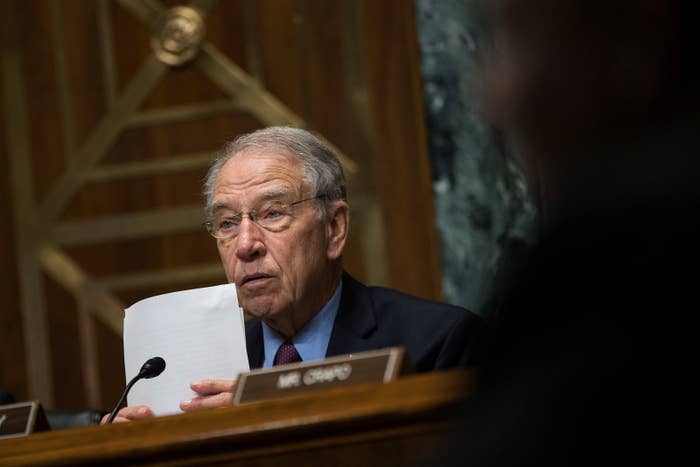
This time last year, Democrats were accusing Republicans of dragging their feet on President Obama’s judicial nominees. Now, Democrats say Republicans are rushing to push through President Trump’s picks.
The Senate Judiciary Committee this week scheduled a June 28 confirmation hearing for two of Trump’s lower court nominees — Trevor McFadden and Timothy Kelly, both nominated for seats on the federal district court in Washington, DC.
The problem, according to Democrats, is that the American Bar Association hasn’t had enough time to evaluate those nominees. Judiciary Committee Democrats said in a joint statement on Thursday that there shouldn’t be a hearing until the ABA review — an “important part of the process,” they said — is finished.
“The Senate Judiciary Committee has an obligation to thoroughly vet nominees for these lifetime judicial appointments. Reviewing potential judges and ensuring they are qualified is one of our most important responsibilities,” the committee Democrats said.
The ABA’s Standing Committee on the Federal Judiciary evaluates all federal court nominees, and issues one of three ratings: well qualified, qualified, or not qualified. The rating is supposed to represent a nonpartisan assessment of a nominee’s qualifications to serve as a judge. Presidents dating back to Dwight Eisenhower — with the exception of President George W. Bush and, now, Trump — have sought ABA review before announcing their nominees.
The ABA review process takes 35 days. Four of Trump’s lower court nominees have come before the Senate Judiciary Committee so far, and the ABA had enough time to issue its ratings in advance. Kelly and McFadden, however, will have their hearing 21 days after their nominations were announced — two weeks before the ABA is expected to finish its evaluation.
Asked about the timing of Kelly and McFadden’s hearing, a spokesperson for Senate Judiciary Committee Chairman Chuck Grassley did not address the ABA review issue, but said in an email that the ABA had already given several of Trump’s other nominees the highest “well qualified” rating. He also said that a “well qualified” rating had not stopped Democrats from opposing Trump’s Supreme Court nominee, Justice Neil Gorsuch, and the president’s first lower court nominee, Judge Amul Thapar, who was recently confirmed to the US Court of Appeals for the 6th Circuit.
“The president has made a number of judicial nominations, some of whom have already received Well-Qualified ratings by the ABA, including circuit court nominees Joan Larsen and Amy Barrett, but the home-state senators apparently need more time to review them, so the committee is moving forward with other nominees, as it has in the past,” Grassley spokesperson Taylor Foy said.
Liberal advocacy groups have also expressed alarm at the Judiciary Committee’s pace. Marge Baker, executive vice president of People for the American Way, said in a statement that the ABA reviews “ensure that nominees for lifetime seats on our nation’s court have basic competence, character and temperament necessary to play a critical role in our justice system.”
Alliance for Justice said it was concerned that Kelly and McFadden were scheduled for a hearing just two weeks after their questionnaires were turned in to the judiciary committee. The questionnaires, which are public, detail a nominee’s work history, writings and speeches, and cases they’ve handled. Alliance for Justice President Nan Aron said in a statement that two weeks is “nowhere near enough time for senators or the public to fully examine their records.”
“Republicans seem determined to confirm nominees virtually overnight in an attempt to prevent their qualifications — or lack of them — from being subjected to the proper scrutiny,” Aron said.
Obama had the ABA review his nominees before they were announced. His first lower court nominee, Judge David Hamilton of the US Court of Appeals for the 7th Circuit, had a hearing before the Democrat-controlled Senate Judiciary Committee 15 days after his nomination was announced. A review of Obama’s other early judicial nominees in 2009 shows that hearings took place anywhere from 27 to 90 days after the nominations were announced.
Trump started out his presidency with far more court seats to fill than Obama did — there were 112 vacancies at the start of January, compared with 53 in January 2009 — and Trump has been announcing nominees at a faster pace. To date, Trump has submitted 17 lower court nominees to the Senate, and one, Thapar, has already been confirmed. There are now 132 vacancies in the federal courts.
By the end of June 2009, Obama had announced seven lower court nominees. Democrats at the time were frustrated with the administration’s pace on judicial nominees, and Republicans and conservative advocacy groups have urged the Trump administration to learn from that experience.

